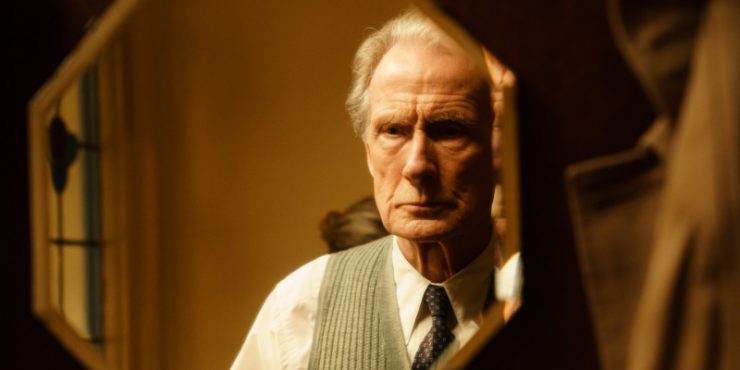The face of Bill Nighy is a character actor’s dream. Expressive, handsome, slightly devilish, Nighy has used that face (and his expansive, wiry frame) to great success in his decades-long career, which has seen him excel in comedy and drama. Mostly a supporting actor, his collaborations with director Richard Curtis (Love Actually, About Time) are his best showcase and they suggest that there is something deeper than the quip-y, comic relief characters he so often plays. Living, his latest release, is an unmistakable lead role in a drama written specifically for him. It feels like something totally different than what he’s done before – the charisma and charm is subdued – and yet, it still feels like an affirmation of an esteemed career filled with memorable characters. Living succeeds on several levels, but it’s best as a testament to Nighy’s undeniable presence that the film truly excels.
Living is a remake of Akira Kurasawa’s 1952 masterpiece Ikiru, which itself is based on Leo Tolstoy’s nineteenth century novella The Life and Death of Ivan Ilych. The evolution of the material is not lost on Kazuo Ishiguro, the nobel-prize winning novelist who writes the film’s screenplay. Born in Japan, Ishiguro has proven himself to be an expert surveyor of his home country of England, which is where he’s lived since the age of 5. The crumbling majesty of Twentieth Century English society is his specialty, and in his 1989 masterpiece, The Remains of the Day, he both dissects the emotionally comatose English manner while showing great affection for the characters trapped by it. The Remains of the Day became one of the best Merchant-Ivory films, and you can see that aspiration in Living, a story that shares the same emotional dichotomy.
Nighy plays Mr. Williams, a government functionary in Public Works whose stern demeanor and soft purr has garnered him a reputation for cold lifelessness (his co-worker jokingly refers to him as “Mr. Zombie”). A widower, he lives with his son (Barney Fishwick) and his daughter-in-law (Patsy Ferran) who are both frustrated by his stasis and thriftiness. At work, Mr. Williams takes pride in burying people in bureaucracy, this includes a group of women interested in building a local children’s park, only to be routinely passed along the government building, each department abdicating responsibility. He sits at the head of a large desk, flanked by half a dozen employees who each support a “skyscraper” of paperwork. As less work gets done, the stack gets higher; their inaction mistaken for efficiency, which doesn’t exactly sit right with new hire, Mr. Wakeling (Alex Sharp).
Mr. Williams’ life is one of rote routine, each day passing without fanfare. When he’s diagnosed with terminal cancer, he does something truly radical: he doesn’t go to work. The death sentence triggers a lust for life, but he finds himself ill-equipped on how to execute it. He tries bar diving with a local writer (a brief but fun Tom Burke) before leaning on his young employee, Miss Harris (Aimee Lou Wood) to show him how to have a good time. Like Kurosawa’s film, Living doesn’t always go where you expect it to. Faced with death, Mr. Williams struggles to embrace the joi de vivre that encompasses similar narratives. He’s ill-fitted to wildness, and finds the search for adventure leaves him feeling only more hollow. In reconstructing Ikiru, Ishiguro makes Living about something he knows a lot about: being British.
Director Oliver Hermanus gives Living a surprisingly lush visual style, evoking David Lean or Carol Reed on a much smaller scale. A character study by definition, Hermanus endeavors to make the experience of watching Living more scrumptious than you anticipate. The effect is handsome if not altogether successful. Living does feel slight next to Ikiru, though part of that is by design. It is more than anything a showcase for Nighy, and the veteran actor takes full opportunity of it. The role is filled with choice monologues that scream for Oscar clip candidacy, but Nighy does manage to make it something more than just awards bait. Playing so thoroughly against type, he plays the notes of melancholy with great precision, ticking away the time until the film’s moments of triumph.
Try as it might, Living is not a Merchant-Ivory film, though it does make a great effort. Ishiguro’s dual anglophobia/anglophilia can get a bit cute at times, but his skills as a storyteller can still wow. Living‘s crowd-pleasing instincts feel correct, digging itself out of the drollness of facing mortality. I think it will make the movie more successful even if it also makes it less interesting. Nighy’s brilliant face, reduced to ponderous stoicism here, still manages to make magic on the screen. It’s one thing for an under-sung actor to get an excellent part, but not everyone can nail it as well as Nighy does here.
Directed by Oliver Hermanus










